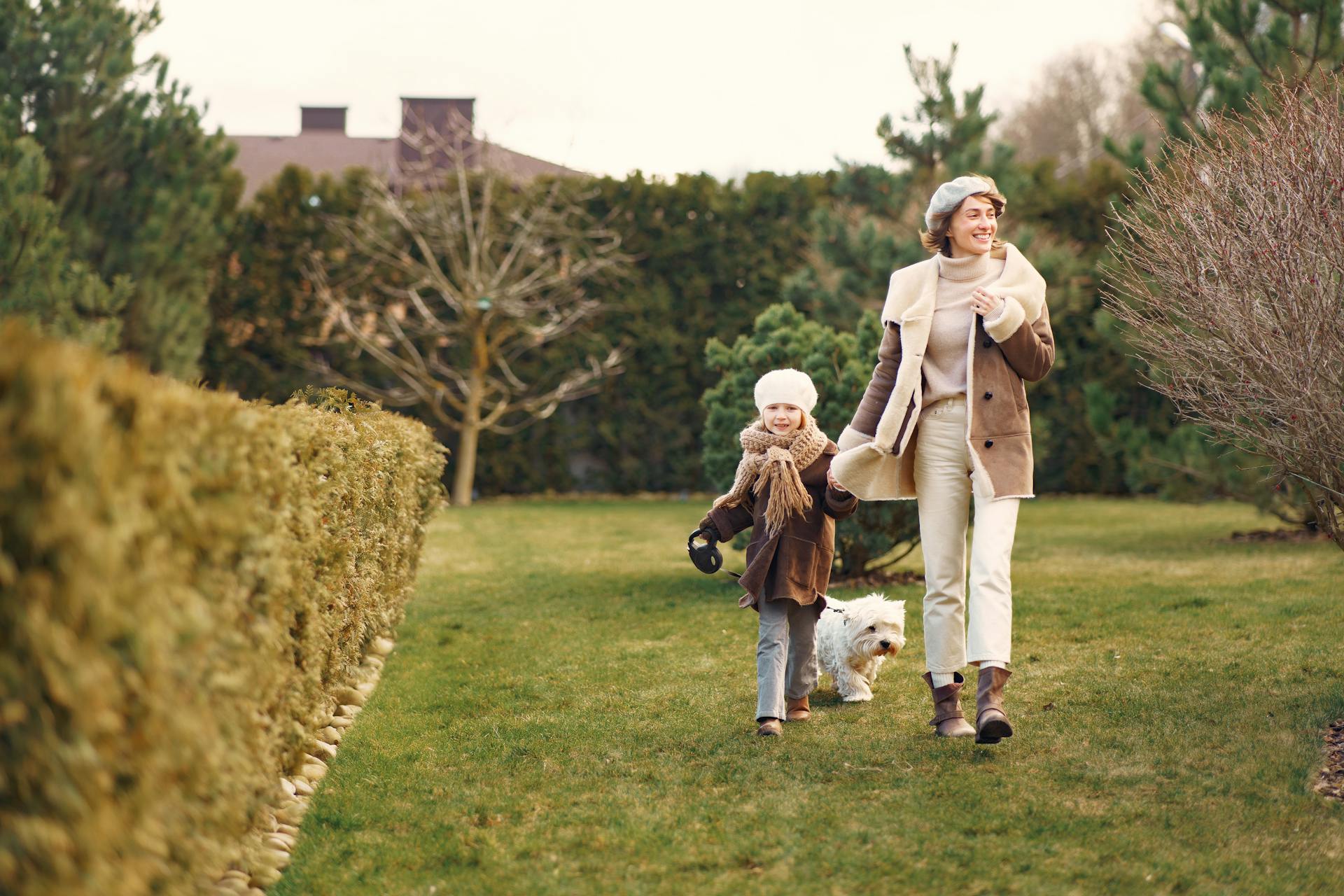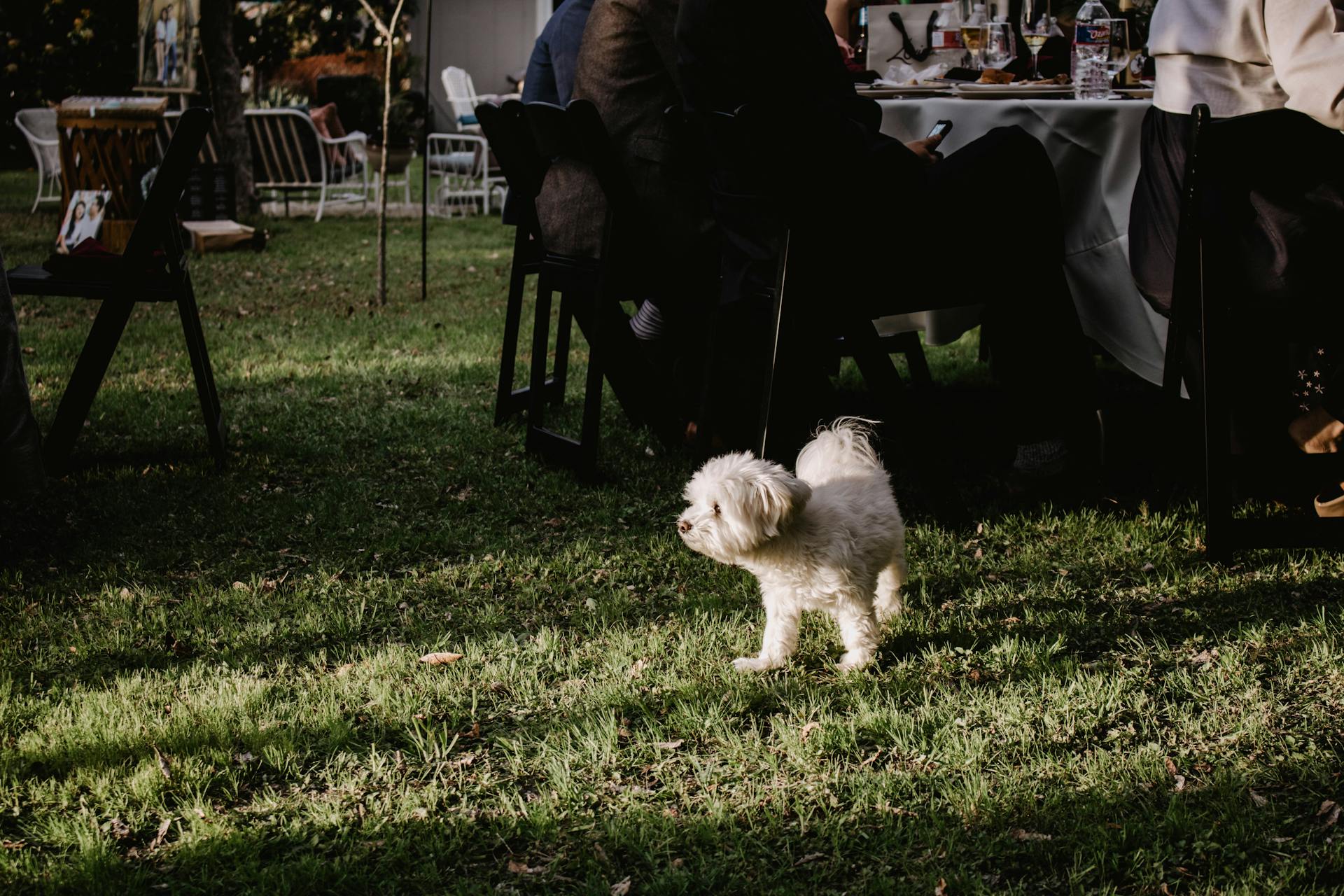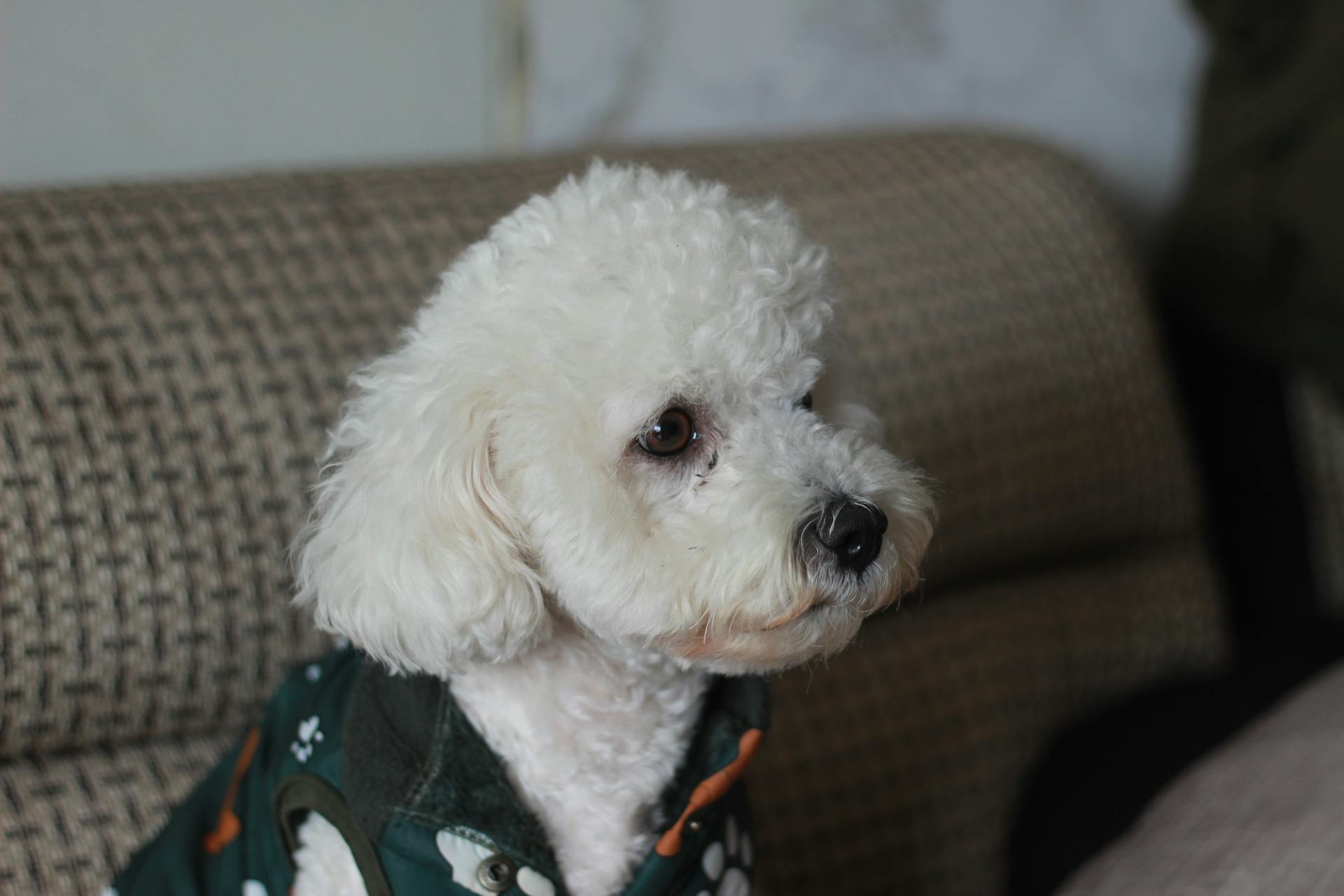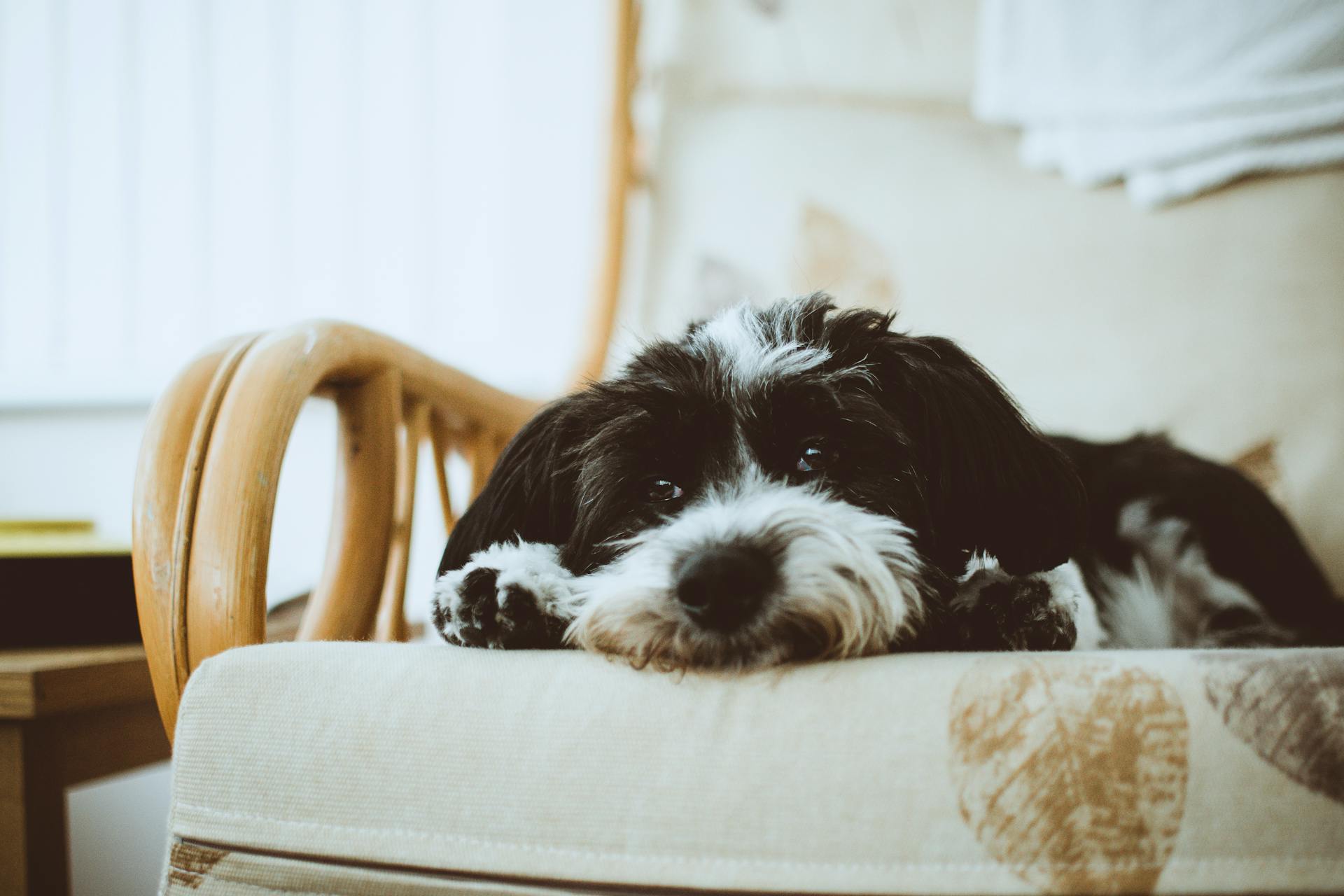
The Havanese Bichon mix is a delightful crossbreed that's perfect for families and first-time dog owners alike. This adorable mix inherits the low-shedding coat of the Bichon Frise and the playful personality of the Havanese.
They're generally small in size, weighing between 7-13 pounds and standing between 9-12 inches tall. Their coat requires regular grooming to prevent matting and tangling.
Their friendly and outgoing nature makes them a great companion for people of all ages. They're also relatively low-maintenance when it comes to exercise, requiring daily walks and playtime but not needing extensive running or training.
Health and Wellness
Havachons are generally a healthy breed, but like all dogs, they can be prone to certain health issues. Progressive Retinal Atrophy is a condition that can cause blindness in older Havachons.
A heart murmur is a common issue in Havachons, and it's essential to have regular check-ups with a veterinarian to monitor its progression. Mitral Valve Disease is another heart-related issue that can affect Havachons.
Portosystemic Shunt is a condition that can cause liver problems in Havachons. Regular X-Rays, Eye Examinations, and Physical Examinations can help detect these issues early on.
Some Havachons may be born with Patellar Luxation, a condition that can cause their kneecaps to slip out of place. Cataracts and Legg-Calve Perthes Disease are also potential issues that can affect Havachons.
Deafness is a common issue in Havachons, and it's essential to be aware of the signs, such as not responding to loud noises. Regular Blood Work and Electrocardiograms can help monitor the heart health of your Havachon.
Here's a list of common health issues that can affect Havachons:
- Progressive Retinal Atrophy
- Mitral Valve Disease
- Portosystemic Shunt
- Heart Murmur
- Patellar Luxation
- Cataracts
- Legg-Calve Perthes Disease
- Bladder Stones and Infections
- Deafness
- Allergies
- Dental Problems
A Brief History
The Havachon breed is a mix of a Bichon Frise and a Havanese, two toy breeds that have a rich history.
The Havanese is the national dog of Cuba and is believed to have been developed from crossing the Blanquito de la Habana with other Bichon types.
The Havanese was only officially recognized by the American Kennel Club in 1996, but it's now a very popular breed.
Both parent breeds of the Havachon come from the ancient Barbichon group, which includes the Havanese, the Bolognese, the Maltese, and the Bichon Tenerife.
The Bolognese, Havanese, Maltaise, and Teneriffe Bichons were developed on the Canary Island of Teneriffe and all originated in the Mediterranean area.
The Bichon Frise was brought to the United States in 1955 and became eligible to enter the American Kennel Club's Miscellaneous Class in 1971.
The Bichon Frise is believed to have been descended from dogs called barbets or water spaniels who were crossed with small white lap dogs.
The Bichon Frise was prized by Italian nobility and later by French royalty, including Henry III, who carried his dogs around with him in a special basket.
The exact ancestry of the Bichon Havanese is unknown, but understanding the temperament and needs of their purebred ancestors can give us a better idea of what to expect from the Havachon.
Appearance and Size
The Havachon is a small dog with a double coat that can be silky, curly, dense, long or short. Common colors are white, cream, grey, black, brown, silver, and blue.
Their tail is likely to curl over the back, and although small, they are quite sturdily built. The eyes are dark and expressive, and the nose is typically black.
Havachons typically stand between 10 and 15 inches tall.
Their weight range is between 10 and 17 pounds.
As a toy dog, the Havachon's height is similar to that of its parent breeds, with most falling around 10 inches tall.
Grooming and Care
Grooming and care for your Havachon are essential to keep them healthy and happy.
Havachons are hypoallergenic dogs, meaning they shed minimally, but they still need regular brushing to prevent matting.
Brush your Havachon's teeth daily, ideally, as early tooth loss is a concern due to their Bichon Frise parent's genetics.
You should also check and clean their ears and claws regularly to prevent infections.
Regular trips to the groomer for trims or full haircuts are necessary due to their fast-growing coats, typically every 6 weeks.
Pet Care
Grooming and care for your Havachon is essential to keep them looking and feeling their best.
You'll need to brush your Havachon's coat 3 times a week to prevent matting and shedding. Regular brushing also helps reduce shedding.
Brushing your Havachon's teeth daily is crucial, especially since they can be prone to early tooth loss. This will help keep their teeth clean and prevent any potential dental problems.
It's also important to check your Havachon's ears and claws regularly to prevent infections. You can wipe their ears with a soft damp cloth and trim their nails as needed.
Taking your Havachon to a professional groomer every 6 weeks for a trim is a must. This will help keep their coat looking neat and prevent any matting.
You can also use dental chews to help keep your Havachon's teeth clean and prevent boredom and anxiety.
Intriguing read: Havanese Puppies Shed
Colors May Change Over Time
Havachons can have a wide variety of colors, including white, cream, golden, tan, brown, grey, black, silver, blue, and salt-and-pepper.
Their coat colors can vary depending on which parent breed's coat they most closely resemble.
For another approach, see: Havanese Colors
Maintenance and Routine
If you're considering bringing a Havanese Bichon mix into your family, you'll want to know about their maintenance needs. They are a hypoallergenic breed, which is great for people with allergies.
Regular grooming is essential to prevent matting and keep their coat looking good. You'll need to brush your pet two to three times a week.
Bathing should only be done when necessary, and with a good dog shampoo to prevent skin irritation. Daily brushing of their teeth is also crucial to prevent dental problems.
Checking their nails regularly is a must, and their ears should be checked weekly for dirt or burrs. You can wipe their ears with damp cotton wool to keep them clean.
Some breeds similar to the Havanese Bichon mix have specific health concerns, so it's essential to be aware of these potential issues. You'll want to secure pet health insurance to avoid high veterinary care costs.
Here are some breeds that are similar in maintenance needs to the Havanese Bichon mix:
- Chi Apso
- Coton Eskimo
- Dusky
- Saint Bernewfie
- Griffonshire
Temperament and Personality
Havachons are playful and cheerful dogs who make great family pets.
They are very loyal dogs who love being around their owners and getting loads of attention. They have a playful, independent streak but hate being left alone and can suffer from separation anxiety.
They will be best suited to an owner who works from home or an active older person who can devote time to them. They are easy to train and quite curious dogs but can be a little stubborn at times.
Havachons are generally clever dogs, eager to learn but sometimes a little on the stubborn side.
They are wonderful family pets and are great with children and other pets. They won't roam and will adapt well to living in an apartment.
They can be wary around strangers, but they're also alert to unusual noises, making them a good watchdog.
Training and Exercise
Havachons are intelligent dogs that love doing tricks and learning new things. They thrive on mental and physical stimulation, making them easily trainable.
To train a Havachon, you'll want to be firm, consistent, and positive in your approach. Avoid using angry or harsh training methods, as they can be sensitive and unresponsive to negativity.
Daily exercise is essential for Havachons, providing an outlet for their energy and keeping them physically and mentally fit. A 30-minute walk or indoor play session should suffice, making them a great breed for apartment living.
Havachons can be stubborn at times, so patience and persistence are necessary when teaching them new things. Positive, reward-based training works best for this breed.
Regular mental activity is just as important as physical activity for Havachons. Teach them tricks, obedience commands, or learn a dog sport like agility together.
Havachons are eager to please and love spending time with their owners. They'll take advantage of a safe yard or space to run and play off-leash, so make sure to provide them with plenty of opportunities for exercise and play.
Remember, Havachons can develop bad habits or behavioral problems if left alone too much, so be sure to spend plenty of time with your pup.
Consider reading: Havanese Training
Food & Diet
Feeding your Havachon is relatively easy and budget-friendly, as they only need one cup of food per day, which can cost anywhere from $30-$50 per month.
You can choose to feed your Havachon premium food, make your own dog food, or even try a raw food diet.
It's essential to ensure your Havachon gets the necessary nutrients for a healthy and strong life, regardless of the food choice you make.
To prevent your Havachon from becoming overweight, which is a common issue with both parent breeds, it's crucial to feed a nutritionally balanced diet and limit treats.
Your veterinarian can help you calculate the right amount of food for your Havachon to maintain a healthy weight.
If you decide to feed a home-cooked diet, your vet will also need to ensure you include all essential nutrients.
Bichon Frises often suffer from food allergies, and it's possible your Havachon could have them too, which may require a special diet.
Related reading: Havanese Feeding Chart
Family and Lifestyle
Havachons are a great fit for families who are home a lot, as they don't like to be left alone for long periods.
They thrive in households with busy, active families who can provide plenty of social interaction.
Their small stature makes them a great choice for families with small children, but it's essential to teach kids how to play appropriately with them to avoid unintentional hurt.
If you're a work-from-home parent, a Havachon is an excellent companion, as they'll be happy to have you around all day.
However, if you have a job that requires you to be away from home for long periods, you may need to consider alternative arrangements to ensure your Havachon's social needs are met.
Owner Experiences
If you're considering bringing a Havachon into your family, you're probably wondering how they'll fit into your lifestyle. Havachons are great with sensible kids, who know how to be respectful around dogs and other animals.
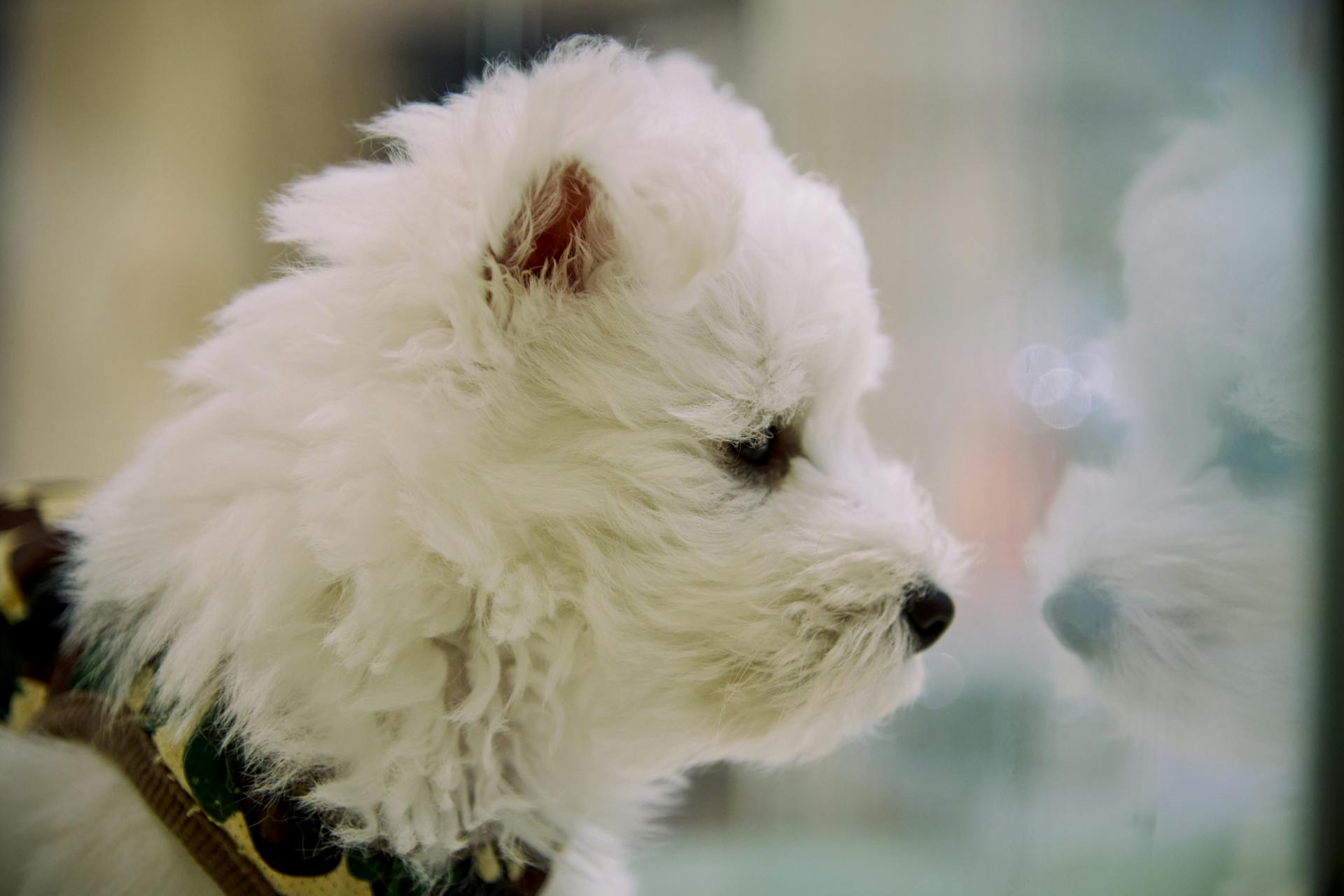
They're very social dogs and love to be around their human family at all times. In fact, they've been known to suffer from separation anxiety, so it's essential to have a work-at-home household or be able to spend a lot of time with them.
Their adaptable nature means they can thrive in any living situation, whether it's an apartment in the city or a country retreat. Just be aware that their small stature may require extra care if you have small children in the household.
Some Havachon owners have reported issues with leash aggression, so it's crucial to socialize your pup properly to help them feel more confident around other dogs. This can be done with positive reinforcement and patience.
Havachons can also be prone to health issues, such as vomiting yellow mucus, especially if they don't eat regularly.
See what others are reading: Havanese Skin Issues
Choosing Toys for Children
Choosing toys for children is a great way to keep them entertained and engaged, especially when you can't be there.
Consider your child's strength, size, and build when selecting toys. This will help prevent injuries and ensure the toy is suitable for them.
Small children often enjoy toys that are lightweight and easy to handle, just like Havachon dogs.
Avoid toys with small items attached, as they can be a choking hazard.
Good Family Pets?
Havachons are a great choice for families with kids who know how to be respectful around dogs and other animals. Their small stature requires careful supervision, especially around small children.
They're social souls who love to mingle with their human family at all times, which means they don't like to be left alone for long periods. This can be a challenge for busy families, but it's also an opportunity to teach kids about responsibility and empathy.
As a small breed, Havachons can be unintentionally hurt by rowdy younger kids, so it's essential to teach children how to play appropriately with them. With proper socialization and supervision, Havachons are generally excellent with kids.
Havachons are affectionate dogs who thrive on attention, but they can develop anxiety and behavior problems if left alone too often. Busy families will need to ensure they can meet the social needs of a Havachon or consider a work-at-home household.
You might enjoy: Are Havanese Good with Kids
Purchasing and Adoption
If you're interested in bringing a Havanesse Bichon Mix into your family, you have two main options: purchasing from a breeder or adopting from a rescue organization.
A Bichon Frise Havanese Mix for adoption will always cost less than one purchased from a breeder. The average price of a Havachon puppy from a breeder is very affordable, falling in the $300 to $800 range.
Adopting an older dog is ideal if you're looking to bypass the puppy stage and get a dog that's already house-trained and less energetic. Many people prefer adopting an older dog to avoid the chewing and destructive behavior that comes with owning a puppy.
Expand your knowledge: Doberman Lab Mix Puppy
Puppies for Sale
The average price of a Bichon Frise Havanese Mix is very affordable, falling in the $300 to $800 range. However, if the breed becomes popular, prices can skyrocket.
You can expect to pay a higher price if a breeder is trying to make a quick buck, but if the price is reasonable, you're likely dealing with a responsible breeder. The quality of the puppy is highly dependent on the health of the parent breeds.
Here's an interesting read: How Much Is a Corgi Husky Mix
Small dogs, especially designer breeds like the Havachon, are often sold by puppy mills and backyard breeders. Avoid buying from a pet store, as their animals often come from these inhumane sources.
Adopting a Havachon is a great option, and you can find them through Havanese or Bichon rescues who also accept mixes of those breeds. Adoption fees vary, but often include medical care like spaying and neutering.
Finding a reputable breeder can be challenging, but it's essential to get a healthy puppy. Be cautious of breeders who are unwilling to provide health checks for the parents or who are pushy about selling a puppy.
Here's an interesting read: Havanese Cross Breeds
Adoption and Rescue
If you're interested in adopting a Bichon Frise Havanese Mix, you can find one through a local rescue organization or adoption center.
A Bichon Frise Havanese Mix for adoption will always cost less than one purchased from a breeder.
Adopting an older dog is ideal if you want to bypass the puppy stage.
Many people don't want to deal with the chewing and destructive behavior that comes with owning a puppy.
You can find a Bichon Frise Havanese Mix for adoption through a local rescue organization or adoption center.
For another approach, see: Husky Lab Mix Behavior
Frequently Asked Questions
How much does a Havachon dog cost?
The cost of a Havachon dog typically ranges from $650 to $1800, depending on factors such as breeder reputation and health clearances. If you're considering bringing a Havachon into your family, read on to learn more about this adorable hybrid breed.
Is a Havachon a good dog?
Yes, Havachons are known to be friendly and loving dogs, making them a great addition to many families. They are often described as wonderful companions due to their gentle and affectionate nature.
Featured Images: pexels.com
